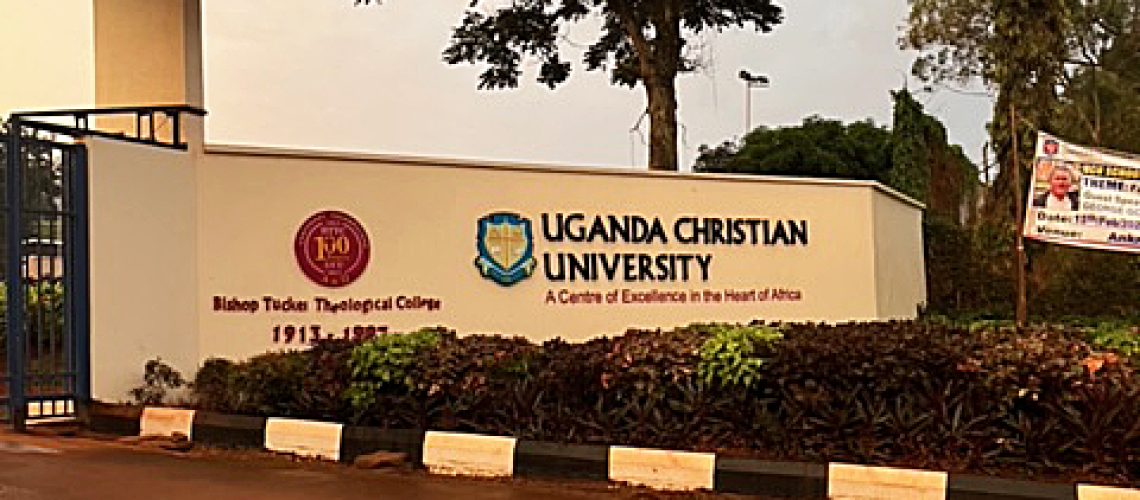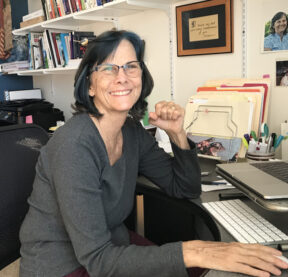
In February, Paraclete associate Dr. Regina Manley traveled to the heart of Africa. Working with the training ministry, DAI (Development Associates International), she came alongside their accredited Master’s level students to provide relevant, real-life instruction. Dr Manley’s class was conducted in Kampala, Uganda thanks to the courtesy of Uganda Christian University. My interview with Dr Manley, below, has been edited for clarity and length. (Full disclosure: Dr Manley is the author’s wife)
As a Paraclete associate, tell me a bit about your ministry background.
Jim and I joined MAF (Mission Aviation Fellowship) and served both expat missionaries and Amazon Jungle tribes in Ecuador. During our 17 years there, I saw that the majority of the people had a strong preference for auditory and social forms of learning. For example, there were six radio stations in the province but not one newspaper.
Later, I worked in MAF’s Learning Technology dept. as their orality specialist. I helped adapt training for those with a strong oral /social learning preference. I also trained Christians to learn and explore the Bible using oral strategies of Bible storytelling and facilitated discussion. This was an exciting decade in my life because these storytelling trainings were empowering people who had previously been passed over for leadership.
In the workshops, literacy was not mandatory. For example, if there were just a few bilingual individuals, we would start in the primary language, like English or Spanish, but then small groups could quickly switch to their unwritten mother tongue and explore the Scripture in their own languages. Both highly literate and illiterate Christians could participate freely and equally in the oral bible storytelling and discussion format. These less educated brothers and sisters often shared deep insights that God’s Spirit would show them. This always surprised the highly literate gatekeepers who had assumed it was necessary for them to interpret the Scriptures to those who were less educated.
I finished this time with MAF by putting the Bible storytelling workshop online so that anyone could learn how to do it by simply gathering a few friends together for practice. The training is called StoryFire and is freely accessible online at https://biblestoryfire.com
I worked as a coach with Spoken International for a few years. They have programs that can effectively train leaders even in an unwritten mother tongue by guiding the local leaders to develop their own oral curriculum by making short audio recordings of Bible stories paired with local idioms. They facilitate discussion about this content and mentor the participants, who in turn mentor others using the same content. Again, this program has people learning large banks of the Bible through accurately retelling and then discussing the stories.
One of the problems I encountered in these decades of Bible storying was the attitude held by many of the highly educated gatekeepers. Frequently, they believed Bible stories were just for children. Even though the Bible storytelling and discussion impacted the Christian leaders I trained, the gatekeepers in their organization did not support this new approach. Their leaders were stuck repeating traditional teaching and preaching patterns that required literacy with lots of reading and writing to be replicated. This CLASH between effective oral/social methods that focus on mentoring, dialogue, and storytelling and literate methods was a primary motivation for me to pursue a doctoral degree. I needed to learn more in order to find a way to expand how traditional Bible school and seminary education happens. Of course, we want literacy, but we need to add the powerful tools of oral/social learning to the mix!
In February of this year, you traveled to Uganda. What did you do there?
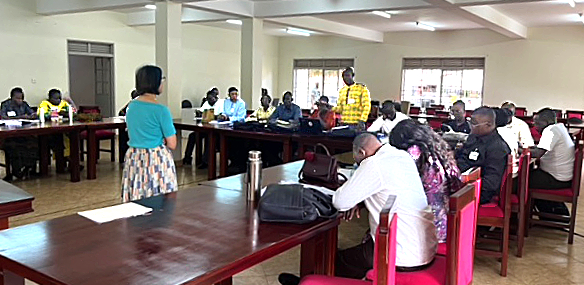
Uganda represents the opposite end of the spectrum. There, I worked with highly educated leaders. I went to Uganda to teach a Master’s Degree class in Research Methods. But this is not the typical Research Methods class. It is highly practical—something that would benefit any Christian leader who is trying to resolve problems in their context. This Master’s degree in Christian Leadership is designed very intentionally to bring transformation in the learners’ lives. The materials in every class are both practical and applicable. The content is designed to focus on what the students are experiencing in their daily lives.
You went under the auspices of DAI, Development Associates International. Who are they?
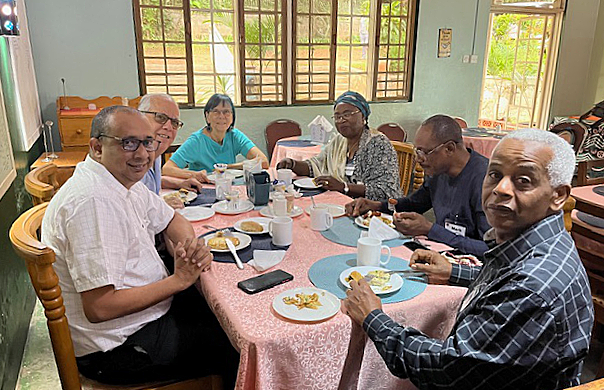
The group began doing research in 1990 with the goal of developing a transformational leadership training curriculum. They deliver “interactive, story-based learning focused on asking the leader questions and requiring application enable[ing] leaders to change.” This is not pouring through reams of content to be remembered, which is typical of far too many Bible classes! The DAI courses focus on the learning and transformation of the leader and challenges their daily leadership practices. Last year, they trained 203,000 leaders in 78 countries through 42 local offices.
Because they want to reach leaders with the least access, most of their programs are workshops that are led by local teachers. Some of these workshops have also been adapted into interactive, self-guided learning labs that can be accessed online and free of charge, extending access to leaders in closed countries. A very small number of DAI students, about 1,000, are also enrolled in an accredited Masters Degree program.
You met on the campus of Uganda Christian University. Tell me about that.
Uganda Christian University is distinguished by over 100 years of training Christian leaders in Uganda. This is one of many universities and seminaries that DAI partners with by offering a high-quality but highly practical Master of Arts Organizational Leadership (MAOL). The MAOL program takes three years. A cohort of 25-30 students meets once every six months for a 5-day residency with two of their instructors. I went to UCU in Uganda for the residency during the first week of February. After the residency, most of the coursework is done online, but I remain available to help the students through the semester. I continue to teach some content most weeks via Zoom.
What course did you teach?
I taught the Research Methods class. DAI uses a research model called “Action Research.” The students will:
- Investigate a problem they or their organization currently face
- Interview and survey people who are directly involved in the problem
- Come up with recommendations that will lead to action steps for their leadership or their organization
The course teaches how to ask questions, make a plan, and conduct tactful inquiries and surveys to learn what was previously unknown and, most importantly, to bring change and transformation to a current, unresolved problem.
What other courses will you teach for DAI?
For 2024, I plan to stick to Research Methods. Next year, I might include Adult Learning Styles because oral/social learning is an important component of that course which is often missed in traditional education. Another class that intrigues me is DAI’s Integrity and Finance. Every leader needs to examine how they manage both concepts in their personal lives first and then expand that to maintaining a high level of integrity in their ministry.
Who are your students, and where are they from?
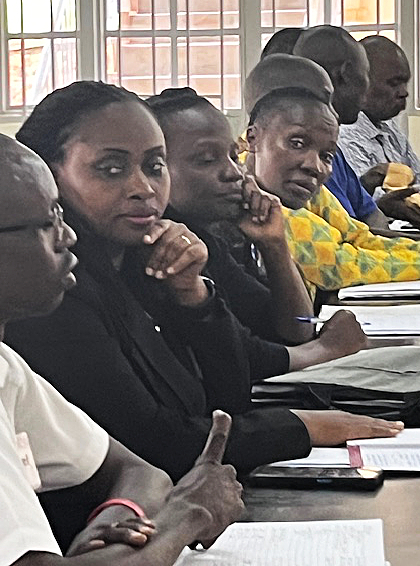
The students were from a wide spectrum. There were a few Anglican priests and some Pentecostal pastors. Some are researching why women are hindered from leadership positions in their denomination, while others are asking why men shun leadership. There are several founders of nonprofit ministries and others working in NGOs. Several are looking into the tremendous problems encountered by unwed teen mothers, others are looking at crop failures caused by radical weather problems. There were several government workers (one tax collector) and university employees. About 1/3 were in a variety of secular jobs. All of them were juggling work and studies, and the majority were married and had families. Most of the students were from Uganda, but some traveled all the way from Southern Sudan.
What is their goal?
Their goal is to grow in their leadership skills and complete this Master’s Degree in Organizational Leadership. DAI has written the course materials in a very personal and interactive manner. One of the students commented that the need for the students to be transparent about their personal lives was surprising and too difficult for some during the first term. This will require additional mentoring.

